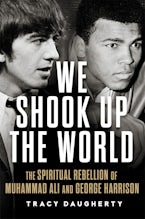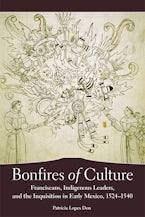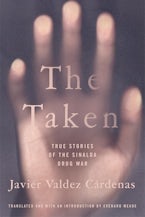HISTORY / World
Showing results 1-10 of 16
Filter Results OPEN +

Empires and Indigenous Peoples
Comparing Ancient Roman and North American Experiences
Sweeping in its scope and rigorous in its scholarship, Empires and Indigenous Peoples expands our understanding of their historical interrelations and raises general questions about the nature of the various imperial encounters.
We Shook Up the World
The Spiritual Rebellion of Muhammad Ali and George Harrison
We Shook Up the World offers a new, intimate perspective on two outsize figures in the nation’s and the world’s cultural history, and a new understanding of their unique contributions to the consciousness of their time and ours.
A Military History of the Cold War, 1944–1962
The Cold War did not culminate in World War III as so many in the 1950s and 1960s feared, yet it spawned a host of military engagements that affected millions of lives. This book is the first comprehensive, multinational overview of military affairs during the early Cold War, beginning with conflicts during World War II in Warsaw, Athens, and Saigon and ending with the Cuban Missile Crisis.
Native People of Southern New England, 1650–1775
Despite the popular assumption that Native American cultures in New England declined after Europeans arrived, evidence suggests that Indian communities continued to thrive alongside English colonists. In this sequel to her Native People of Southern New England, 1500–1650, Kathleen J. Bragdon continues the Indian story through the end of the colonial era and documents the impact of colonization.
Bonfires of Culture
Franciscans, Indigenous Leaders, and the Inquisition in Early Mexico, 1524–1540
In their efforts to convert indigenous peoples, Franciscan friars brought the Spanish Inquisition to early-sixteenth-century Mexico. Patricia Lopes Don now investigates these trials to offer an inside look at this brief but consequential episode of Spanish methods of colonization, providing a fresh interpretation of an early period that has remained too long understudied.
The Taken
True Stories of the Sinaloa Drug War
In his informative introduction to the volume, translator Everard Meade orients the reader to the broader armed conflict in Mexico and explains the unique role of Sinaloa at its epicenter. Reports on border politics and infamous drug traffickers may obscure the victims’ suffering. The Taken helps ensure that their stories will not be forgotten or suppressed.
The French and Indian War and the Conquest of New France
The French and Indian War was the world’s first truly global conflict. When the French lost to the British in 1763, they lost their North American empire along with most of their colonies in the Caribbean, India, and West Africa. In The French and Indian War and the Conquest of New France, the only comprehensive account from the French perspective, William R. Nester explains how and why the French were defeated. He explores the fascinating personalities and epic events that shaped French diplomacy, strategy, and tactics and determined North America’s destiny.
Napoleon in Italy
The Sieges of Mantua, 1796–1799
Drawing on underutilized military records in Austrian, French, and Italian archives, Cuccia delves into these important conflicts to integrate political and social issues with a campaign study. Unlike other military histories of the era, Napoleon in Italy brings to light the words of soldiers, leaders, and citizens who experienced the sieges firsthand.
From Boer War to World War
Tactical Reform of the British Army, 1902–1914
The British Expeditionary Force at the start of World War I was tiny by the standards of the other belligerent powers. Yet, when deployed to France in 1914, it prevailed against the German army because of its professionalism and tactical skill, strengths developed through hard lessons learned a dozen years earlier. In October 1899, the British went to war against the South African Boer republics of Transvaal and Orange Free State, expecting little resistance. A string of early defeats in the Boer War shook the military’s confidence. Historian Spencer Jones focuses on this bitter combat experience in From Boer War to World War, showing how it crucially shaped the British Army’s tactical development in the years that followed.
Outpost of Empire
The Napoleonic Occupation of Andalucia, 1810–1812
Esdaile’s study is a significant contribution to the new field sometimes known as occupation studies, which focuses on the ways a victorious army attempts to reconcile a conquered populace to the new political order. Combining military history with political and social history, Outpost of Empire delineates what we now call the cultural terrain of war. This is history that moves from battles between armies to battles for hearts and minds.

Empires and Indigenous Peoples
Comparing Ancient Roman and North American Experiences
We Shook Up the World
The Spiritual Rebellion of Muhammad Ali and George Harrison
A Military History of the Cold War, 1944–1962
Native People of Southern New England, 1650–1775
Bonfires of Culture
Franciscans, Indigenous Leaders, and the Inquisition in Early Mexico, 1524–1540
The Taken
True Stories of the Sinaloa Drug War
The French and Indian War and the Conquest of New France
The French and Indian War was the world’s first truly global conflict. When the French lost to the British in 1763, they lost their North American empire along with most of their colonies in the Caribbean, India, and West Africa. In The French and Indian War and the Conquest of New France, the only comprehensive account from the French perspective, William R. Nester explains how and why the French were defeated. He explores the fascinating personalities and epic events that shaped French diplomacy, strategy, and tactics and determined North America’s destiny.
Napoleon in Italy
The Sieges of Mantua, 1796–1799
Drawing on underutilized military records in Austrian, French, and Italian archives, Cuccia delves into these important conflicts to integrate political and social issues with a campaign study. Unlike other military histories of the era, Napoleon in Italy brings to light the words of soldiers, leaders, and citizens who experienced the sieges firsthand.











